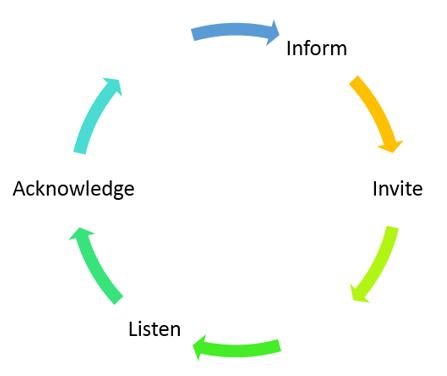What is the Conversation Cycle?
What is the Conversation Cycle?

Definition: The Conversation Cycle is a model which shows how we can use four interrelated communication skills - informing, inviting, listening, acknowledging - to get the best results from all our conversations.
Conversations are an opportunity for people to share information, ideas and emotions. Ideally, everyone in the conversation should be cycling through each of the four stages, so that, as the speaker is "informing" and "inviting", the others are "listening" and "acknowledging".
Then people swap roles, so that, when the conversation is finished, everyone has completed the "conversation cycle".
Let us examine each of the four elements of the conversation cycle.
Informing.
Informing is when speakers verbalise their thoughts, ideas, opinions and feelings.
Speakers should think first, and then speak.
Many people have the bad habit of verbalising their thought process as they speak.
Consequently, they are not strictly "communicating their ideas and opinions". Instead they are letting others listen-in on their thought process as they struggle to form their ideas and opinions.
Instead of giving a running commentary on your thought process, slow down and figure out what you really want to say. Think before you speak. Do not blurt-out ill formed ideas.
Invite.
Invite is when the speaker pauses and invites comments or questions on the content they have already expressed.
Many speakers talk too much and for too long, without pausing to invite comments.
This is a mistake, and the conversation becomes a "monologue", where a single person hogs the conversational limelight.
Good conversationalists know when to stop talking and invite comment.
Now let us look at the other two complementary communication cycle skills.
Listening.
There are two forms of listening: Passive and Active.
Passive listening: Many people are passive: they allow their minds to wander. True listening is an active thought process. It takes effort.
Active listening: Active listening is a fully conscious attempt to understand what the speaker is saying.
When you are listening, look at the persons face, and try to visualise what they are saying.
If you actively try to visualise what you are hearing, your comprehension will double, and you will, by implication, complement the speaker, by doing them the honour of actively listening.
Acknowledge
Acknowledge is affirming to the speaker your understanding (though not necessarily your agreement) of what has been said.
Acknowledgement can come in many forms:
"You're wrong!" is not a good way to acknowledge an idea you disagree with. "I understand." is a better way to acknowledge an idea you don't agree with.
"I agree", is a good way to acknowledge an idea you do agree with.
Whether agreement is gained or not, the people now swap roles: The original "informer-inviter" becomes the "listener- acknowledger" and vice-versa.
And so, the conversation cycle continues.
Further reading: How to be a good conversationalist.
Definition: Conversation Cycle
In workplace communication, the conversation cycle is a model that guides two or more people through four linked skills: informing, inviting, listening and acknowledging. Each person shares clear thoughts, asks for feedback, listens with focus and shows they understand. The roles then swap so all complete the same four steps, turning a one-way talk into an open exchange.
Show CG4D Definition
- Uses four fixed skills: informing, inviting, listening, acknowledging
- Runs in a set order to guide each talk
- Requires every person to switch between speaker and listener roles
- Aims to reach shared understanding through two-way exchange
Article Summary
Great talks run in a simple loop: you share clear ideas, invite reply, listen with full focus and acknowledge what you hear; follow this conversation cycle and every meeting turns into a true exchange, not a monologue.
Frequently Asked Questions
Here are some questions that frequently get asked about this topic during our training sessions.
What are the four stages of the conversation cycle?
Why should a speaker pause to invite feedback?
How is active listening different from passive listening?
What is a polite way to acknowledge a point you dislike?
How does thinking before speaking improve informing?
Can the conversation cycle help in workplace meetings?
How do I stop dominating a conversation?
Thought of something that's not been answered?
Did You Know: Key Statistics
Gallup’s 2023 State of the Global Workplace report finds that teams with strong two-way communication post 18% higher productivity than low-engagement teams. Microsoft’s 2024 Work Trend study shows 48% of hybrid workers name poor communication as the main block to effective meetings.Blogs by Email
Do you want to receive an email whenever we post a new blog? The blogs contain article 5-10 minutes long - ideal for reading during your coffee break!
Further Reading in Communication - Clear Communication
-
Define Your Key Terms
Define key terms to end vague talk, sharpen clear communication and set clarity you can measure. Use four questions to turn vague hopes into testable plans.
Read Article > -
How to be a better communicator
Learn four steps to be a better communicator: focus on clear goals, use specific language, give logical reasons and stay polite to boost cooperation today.
Read Article > -
Presentation Skills for Nervous People
Learn presentation skills that turn nerves into confidence. Our six-step method covers purpose, structure, pace, voice and body language so you speak with ease.
Read Article > -
How to Politely Say 'No' to Your Boss
Learn how to say no to boss requests without harm. Use clear reasons, positive replies and set boundaries to avoid work overload and keep good relations.
Read Article > -
Communication Skills in Business
Learn why feedback in business boosts performance and how to give constructive criticism, avoid destructive remarks and use praise to inspire engaged teams.
Read Article >
Looking for Communication Skills Training?
If you're looking to develop your Clear Communication Skills, you may find this Communication Skills Training Course beneficial:
Open Training Course Pricing and Availability
Next Open Course Starts in 6 days, London - Central, places available






